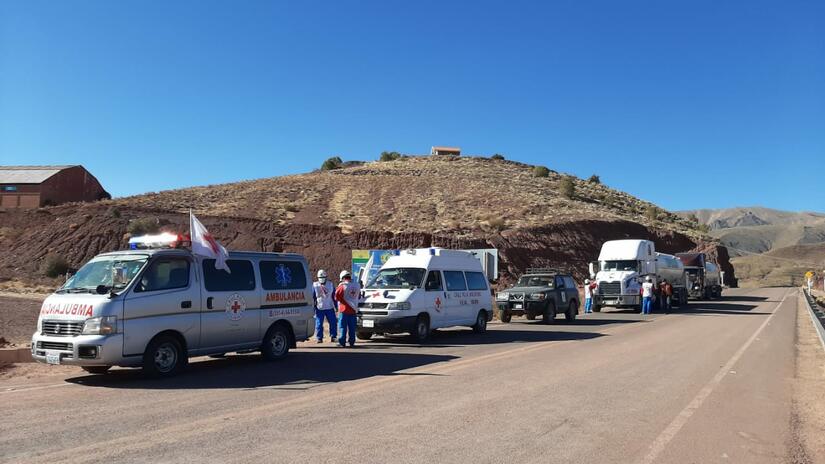by Melissa Monzon
Santa Cruz, August 10, 10:00am. Magdalena gets ready for the arduous day. The situation room is activated. Today, volunteers and staff from the Bolivian Red Cross – Santa Cruz branch will be starting with the mission: to accompany the transportation of three trucks that will carry oxygen to different hospitals in the departments of Cochabamba, Oruro and La Paz.
In Bolivia, cases of COVID-19 have been increasing in the last weeks, and in many hospitals, there is a shortage of oxygen. This is why this mission is so important. But it won’t be an easy one, there have been blockades in different parts of the country for days, so getting the caravan to its destination requires great coordination efforts.
“The role that each volunteer has played in the operation has been very important, in dialogue with communities. Demonstrating the impartiality and neutrality of the organization and giving the population that confidence that the Red Cross was in a humanitarian mission.”, says Magdalena Choque, head of the team for the humanitarian convoy of the Bolivian Red Cross – Santa Cruz branch.
“From the planning area we begun to develop the action plan, the security plan, the risk analysis, in accordance with the operation. A monitoring and logistics teams was activated, and a suitable and trained team was formed for this operation. Also, the monitoring area coordinated with the Cochabamba branch to give continuity to the humanitarian convoy”, she adds.
Cochabamba, August 12, 04:00 am. Karla Vogt is awake early, monitoring that the transfer occurs withing security parameters. As the focal point of Safer Access, she ensures that the mission is carried out correctly, taking care of the safety of those who participate in it.
It is already 17:00hrs., and the Santa Cruz branch is about to arrive at the meeting point to make the change with the Cochabamba branch; here, other volunteers and staff will take over to continue the journey until the oxygen is delivered to where it is needed.
“One of the biggest challenges that we had was to maintain a constant coordination and monitoring; coordination with different organizations and government entities, to avoid subsequent risks. Demonstrating our humanitarian mission, and above all, respect for our fundamental principles, which allowed us to start dialogues and conversations at points of blockage.”, says Karla. “The branches and volunteers in the field have been able to adapt to the different changes, to a tense and difficult situation, and have been able to apply all the principles already instilled. The Bolivian Red Cross has been able to enhance these virtues in the volunteers and that is something very remarkable.”
In total, there were more than 28 people, including volunteers and staff, who accompanied the caravan, throughout the six days since it left the city of Santa Cruz until it reached La Paz. The caravan transported 66 tons of oxygen, which supplied hospitals in different parts of the country. Coordination between five branches of the Bolivian Red Cross – Santa Cruz, Cochabamba, Chuquisaca, Oruro and La Paz – allowed that this to be achieved. It wasn’t an easy job, but everyone was convinced of the importance of the operation. “The volunteers and staff were the guardians of that key element to save lives at this time. I think we all had this in mind and put all the efforts, and all our hearts and all our knowledge and skills to achieve the goal”, concludes Karla.
Article
World Radio Day: How radio helps keep communities healthy and safe
World Radio Day: How radio helps keep communities healthy and safe
| Article

